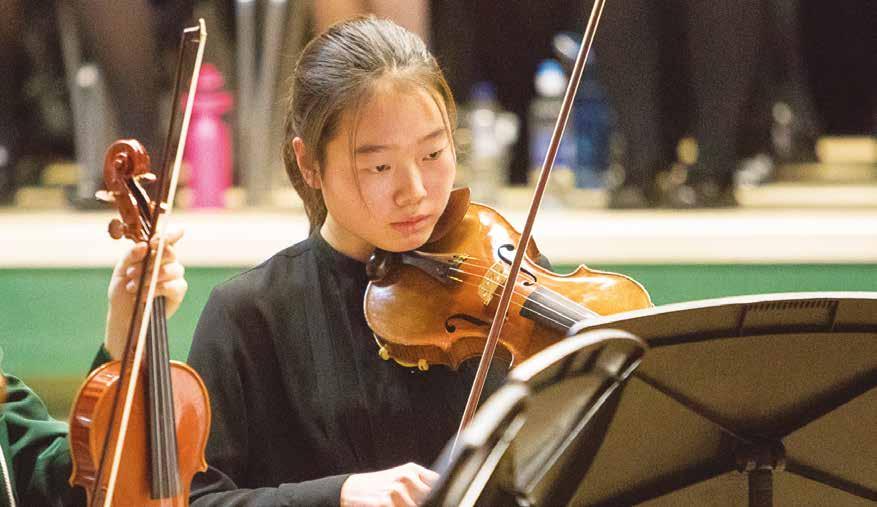
3 minute read
Music
Examination Board: Edexcel
Many students choose to study Music at KS5 because of their innate love for the subject, the challenge and stimulation it provides, and because it is a subject widely respected by universities. Some of the skills involved are unique to the subject, but many other disciplines complement the work of other subjects. A-level Music is strongly recommended for anyone who enjoys performing, composing and listening to music, and is mandatory for anyone who hopes to pursue a performing course at Music college or wishes to take an academic Music course at university. Although some students may study A-level Music without having any other prior qualification, it is helpful to have studied Music at GCSE. We recommend that you can perform to Grade 6 standard before starting the course. You will also need to be able to write English fluently, have a good 'musical ear' (e.g. completing aural tests successfully within your performance exams) and have had experience composing. Most importantly, you should be keen to explore and evaluate a wide range of musical styles, both as a listener and as a participant. A-level Music is an excellent foundation for a range of careers in the Arts, which include performing, composing, teaching, musical research, journalism, arts management and music therapy. Music is also unusual in that many professionals from other walks of life are often enthusiastic and highly accomplished amateur musicians and, while many students intend to work in a different field, they find that A-level Music gives them the background to pursue a lifelong interest in playing and listening. It is worth noting that in 2011, the Confederate of British Industry outlined the seven skills that define employability: self-management, teamwork, business and customer awareness, problem solving, communication, numeracy, and IT skills. Music students develop all seven of these. By this measure, music graduates are among the most employable of all.
Component 1: Performing – 30% of the Qualification (60 marks)
A public performance of one or more pieces, performed as a recital.
■ The performance can be playing (any instrument(s) and/or voice) within a solo and/or ensemble setting. Improvising and realised (music using music technology) performances are also accepted.
■ The total performance time across all pieces must be a minimum of eight minutes.
■ The recital will take place in March of Year 13.
Component 2: Composing – 30% of the Qualification (60 marks)


Total of two compositions; one to a brief set by the exam board and one either free composition or also to a brief.
■ One composition must be from either a list of briefs related to the areas of study, or a free composition, carrying 40 marks for this component. This composition must be at least four minutes in duration.
■ One composition must be from a list of briefs assessing compositional technique, carrying 20 marks for this component. This composition must be at least one minute in duration, unless the brief specifies a longer minimum duration. Compositional techniques include Bach chorale, Two-part counterpoint, Arrangement and Remix.
■ Total time across both submissions must be a minimum of six minutes.
Component 3: Appraising – 40% of the Qualification (100 marks)
Content overview:
■ Knowledge and understanding of musical elements, contexts and language.
■ Application of knowledge through the context of six areas of study, each with three set works.
■ Application of knowledge to unfamiliar works.
■ The areas of study are: Vocal Music,
Instrumental Music, Music for Film,
Popular Music and Jazz, Fusions, New
Directions.










